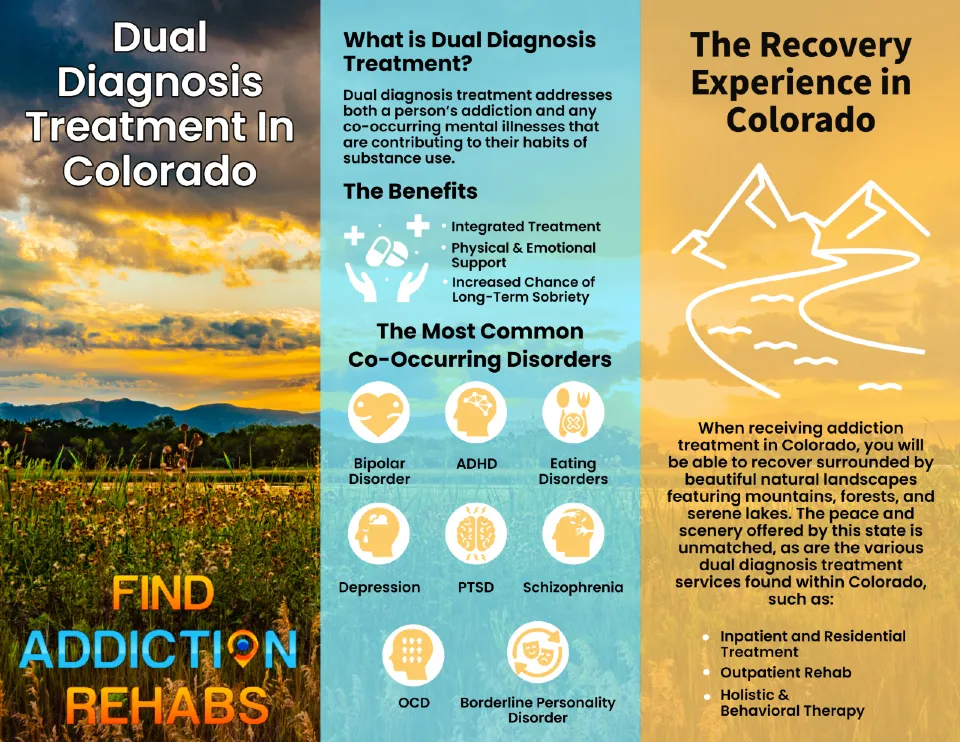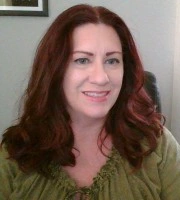What Is A Dual Diagnosis?
Table of Contents
- What Is A Dual Diagnosis?
- What Are Mental Health Disorders?
- What Is Mental Illness?
- How Are Addiction And Mental Health Related?
- Addiction Withdrawals And Mental Illness
- What Is Dual Diagnosis Treatment?
- What Does Dual Diagnosis Treatment Look Like?
- Colorado Dual Diagnosis Treatment Centers
- Features of Inpatient Treatment
- Outpatient Treatment Services
- Medical Detox and Dual Diagnosis Treatment in Colorado
- Partial Hospitalization Programs or PHPs
- Paying For Dual Diagnosis Treatment Centers In Colorado
- Find a Dual Diagnosis Treatment Center In Colorado
- Medically Reviewed By
Before getting into dual diagnosis treatment, it is important to first understand what mental health and dual diagnosis are. A dual diagnosis is the presence of both a mental illness and a substance abuse problem within an individual. With the rise in mental health concerns accompanying substance use, finding dual diagnosis treatment centers in Colorado is a top priority for effective treatment.
Substance abuse or addiction within an individual can indicate a substance use disorder (SUD). A SUD is a type of mental disorder that affects an individual’s brain and limits its ability to inhibit substance use.
Keep reading to find out more about the details of what dual diagnosis is and how it is treated, along with ways of finding dual diagnosis treatment in Colorado!
What Are Mental Health Disorders?
Education and knowledge about mental health conditions are very limited within our society. Mental health disorders are psychiatric conditions in which an individual’s thinking, behavior, mood, feeling, and perception are affected.
These disorders are often life-long disorders in which individuals learn to live and manage their symptoms themselves. Some of the many disorders including:
- Bipolar disorder
- Borderline personality disorder
- Post-traumatic stress disorder or PSTD
- Personality disorders
- Depression or other mood disorders
- Eating disorders
- Anxiety disorders
These are some of the more common mental disorders found in individuals. Individuals with mental illness struggle through their symptoms within society surrounded by people who do not properly understand or comprehend their experience.
This can be very jarring to their reality and the many issues they must process and manage. Medications can be beneficial to these individuals to provide them and support them with proper functions.
The issues with medication come with the types of substances used in some medications. Some substances used to treat mental illness have a high capacity for abuse and addiction. This can lead to drug addiction in an individual.
There are other forms of therapy and coping methods to support these individuals through their mental health issues however, the main forms of treatment available for struggling individuals are medications.
What Is Mental Illness?
Mental health disorders, mental health conditions, and mental illness are all different terms for the same type of condition. Traditionally, mental illness was the term that defined these mental health conditions however, as time goes on and understanding of mental health improves, the term has changed to mental disorders.
Mental illness is a stigmatized term for mental disorders which worsens the view of individuals struggling with these disorders. An individual struggling with disorders may become or feel isolated from many in life.
Mental illness is not a choice nor is it a weakness within an individual, yet a common assumption about mental illness is exactly that. The lack of understanding and difficulties with mental illness can lead struggling individuals to substance use as a method of coping.
This method of coping within an individual is potentially dangerous and can be one of the root causes which lead to drug addiction.
How Does Someone Develop A Mental Disorder?
It is highly unlikely for an individual to suddenly develop a mental disorder. Individuals struggling with mental health issues often have been managing or coping with their disorder throughout their daily lives.
There can be a variety of factors that cause mental health issues to develop. Some of the ways in which someone may develop a mental disorder include:
- Family history or genetics
- Brain injury
- Alcohol or substance use
- Traumatic life experiences
- A mother’s exposure to harmful toxins or chemicals during pregnancy
How Are Addiction And Mental Health Related?
Mental health is a major part of addiction. Addiction changes core functions within the brain which relate to behaviors, actions, and feelings. Individuals that struggle with mental disorders are more likely to develop an addiction to a substance.
As individuals live through the symptoms of their mental issues in their daily experience, they find coping mechanisms and ways to manage their symptoms. This unfortunately can lead to an individual struggling with substance abuse.
Individuals may rely upon substances as a way of self-medicating to manage their experiences. Self-medicating is assessing a form of medication without a prescription or consulting a medical expert. This can lead to drug and alcohol abuse among individuals.
Addiction Withdrawals And Mental Illness
Many of the addiction withdrawal symptoms from drug abuse are also connected to mental health. Some of the withdrawal symptoms that strongly influence the mental conditions of an individual include:
- Anxiety
- Insomnia
- Changing moods
- Depression
- Irritability
- Hallucinations
- Cravings
- Paranoia
What Are Co-Occurring Disorders?
A co-occurring disorder refers to a separate mental disorder alongside a SUD. Often, while diagnosing and determining an individual has a SUD, an individual is roughly half as likely to have a co-occurring disorder as they are to not have one.
Co-occurring disorders are also the core essence of dual diagnosis disorders. It is important to diagnose and determine underlying conditions within an individual to allow them to receive proper treatment.
It is important for individuals with other mental illnesses to receive dual diagnosis treatment when treating addiction.
What Is Dual Diagnosis Treatment?
Dual diagnosis treatment is a form of addiction treatment for individuals with a substance use disorder as well as a co-occurring disorder. A dual diagnosis treatment incorporates the mental conditions of an individual into their treatment.
This allows them to maintain recovery and abstinence from drug abuse. The main focus of dual diagnosis treatment is to properly address the multiple needs of individuals struggling with their mental health conditions.
If an individual isn’t properly treated for their disorders, it is more likely to lead to problems arising later on even after recovery. To maintain proper recovery, it is important for an individual to be treated not just for substance abuse, but for all of their needs.
Dual diagnosis treatment is typically a form of integrated treatment. Integrated treatment is a form of treatment that incorporates multiple types of treatments such as psychotherapy and pharmacotherapy.
Psychotherapy can be seen in treatments such as behavioral therapies to help an individual process and recover their brain functions. Pharmacotherapy can be seen as medications that are implemented to support an individual’s mind and body through recovery.
What Does Dual Diagnosis Treatment Look Like?
There is no one type of treatment that best fits dual diagnosis treatment. Individualized treatment plans are created to find the best treatment that works for an individual and their needs.
Individuals typically work together with a treatment provider to properly create a treatment program that fits their needs. Although treatment is different for everyone, each treatment program is crafted to fit an individual.
Through a treatment program, an individual is able to understand themselves significantly better and learn how to properly manage their behaviors. This is usually achieved through behavioral therapies.
One of the first steps in dual diagnosis treatment, as well as substance abuse treatment in general, is to undergo medical detox. This treatment is a drug detoxification program that allows individuals to safely stop using substances.
Dual diagnosis care can have a variety of resources and treatments to better provide stability and behavioral health within an individual. Family counseling sessions may be beneficial for individuals to receive support from family members.
Colorado Dual Diagnosis Treatment Centers
Dual diagnosis treatment centers provide an individual with the support they need to get through their co-occurring disorders and substance abuse treatment. Dual diagnosis treatment centers are equipped with the proper resources for mental health treatment.
A dual diagnosis treatment program may include specific therapies such as dialectical behavior therapy which helps an individual with key factors within their life. According to the National Institute on Drug Abuse, there are 5 factors which are:
- Enhancing capabilities
- Generalizing capabilities
- Improving motivation and reducing dysfunctional behaviors
- Enhancing and maintaining therapist capabilities and motivation
- Structuring the environment
The 5 factors allow for individuals struggling with mental illnesses, such as bipolar disorder, to learn and properly process core life functions. This can include processing emotions or understanding what causes dysfunctional behaviors.
Features of Inpatient Treatment
Inpatient treatment is a form of residential treatment with resources available to individuals and provides them with the care and support they need. This form of treatment typically entails more intensive care.
One inpatient program or treatment model includes the therapeutic community (TC). This model is a form of resocialization which allows individuals to slowly rebuild and become more comfortable in social settings.
Residents and staff all participate in this treatment form and allow an individual to rebuild their social skills as well as build healthy coping methods. This stability in the treatment form allows an individual to properly rebuild their skills.
Outpatient Treatment Services
Outpatient treatment is a form of visitation treatment that focuses on many different forms of therapy. This treatment can have varying forms of intensity and programs to better fit an individual’s needs.
It is also less costly than inpatient care and provides a treatment option for individuals struggling financially. Relapse prevention and social skills are major parts of this care. Some of the many forms of treatments include:
- Behavioral therapy
- Addiction services
- Family therapy
- Group therapy
Intensive therapy in an outpatient setting can be called Intensive outpatient treatment, which can be just as intense as inpatient treatment. This option provides individuals with the proper flexibility and intensity to fit their needs.
Behavioral Therapy
As addiction affects the brain and changes behaviors, behavioral therapy helps individuals return to properly learning how to function well. Individuals can learn to recognize negative behaviors and replace them with positive behaviors.
Addiction Services
There are many beneficial skills that are around to better help and support individuals through addiction. Addiction services mainly focus on developing coping mechanisms, skills, and preventive behaviors within an individual to allow them to manage their daily experience.
Family Therapy
Family therapy provides education regarding addiction and mental illness to the family members of an individual as well as allows them to process the behaviors that addiction has brought onto all of them.
Group Therapy
Group therapy can be seen as support groups such as alcoholics anonymous for alcohol addiction. These types of groups can help provide a social community to individuals that struggle with social communications.
Medical Detox and Dual Diagnosis Treatment in Colorado
A medical detox is a form of 24-hour inpatient or residential treatment in which an individual lives onsite at a treatment center to cleanse substances from their system. In this treatment, individuals are able to safely ease off of substances.
Many substance abuse withdrawals can be difficult to manage and even life-threatening. The constant care from medical professionals allows individuals to safely and comfortably manage their withdrawals.
With dual diagnosis treatment, it is likely an individual needs assistance and treatment for a co-occurring disorder. These disorders can make withdrawal symptoms or make mental illness worse.
Partial Hospitalization Programs or PHPs
Partial Hospitalization Programs (PHPs) are a form of intensive outpatient treatment in which an individual is treated in a hospital setting for most of the day but does not stay overnight. These treatment centers are found within a hospital.
As this form of treatment is an outpatient treatment, it provides flexibility for individuals that have other outside responsibilities that they must attend to such as work, school, and parental responsibilities.
Paying For Dual Diagnosis Treatment Centers In Colorado
An individual may lean away from getting help due to financial struggles. Mental and behavioral health services are essential parts of an insurance plan. Although the amount of coverage does change from plan to plan, it is an essential part.
Some of the commonly accepted insurances within dual diagnosis treatment centers in Colorado include:
There is also an option called sliding fee scale therapy which refers to treatment that is priced depending on an individual’s income. This can be helpful for individuals without health insurance.
Find a Dual Diagnosis Treatment Center In Colorado
Searching for treatment can seem like a very overwhelming task to manage on your own. It can be difficult to find dual diagnosis treatment centers that suit you. Here at Find Addiction Rehabs, we make that process easy.
Whether finding a treatment center in your location or connecting you with recovery tools and resources, our hotline is available 24/7 to make sure you can get the help you need, anytime you need it.
Trying to manage mental health on your own can be immensely difficult, especially alongside substance abuse and addiction. Call us today and we will help find the right dual diagnosis treatment program for you!
Deborah Tayloe is a freelance writer specializing in health and sciences. Deborah earned a B.S.Ed. in Secondary Education/English, accompanied by a Spanish minor. Her writing expertise allows her to craft engaging, impactful articles to help people be well.
In addition, she holds a fully accredited Certificate of Natural Medicine and is a certified Herbalist. Through her understanding of complementary medicine, Deborah helps medical professionals give people the information they need to embrace natural approaches to wellness.
When she’s not working, Deborah trains for 5K races and advocates for animal rights.







